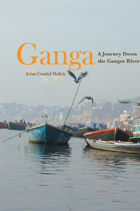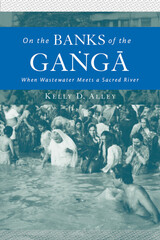2 books about Ganga

Ganga
A Journey Down the Ganges River
Julian Crandall Hollick
Island Press, 2007
The Ganges has always been more than just an ordinary river. For millions of Indians, she is also a goddess. According to popular belief, bathing in “Mother Ganga” dissolves all sins, drinking her waters cures illness, and dying on her banks ensures freedom from the cycle of death and rebirth.
Yet there remains a paradox: while Ganga is worshipped devotedly, she is also exploited without remorse. Much of her water has been siphoned off for irrigation, toxic chemicals are dumped into her, and dams and barrages have been built on her course, causing immense damage. Ganga is in danger of dying—but if the river dies, will the goddess die too?
The question took journalist Julian Crandall Hollick on an extraordinary journey through northern India: from the river’s source high in the Himalayas, past great cities and poor villages, to lush Saggar Island, where the river finally meets the sea. Along the way he encounters priests and pilgrims, dacoits and dolphins, the fishermen who subsist on the river, and the villagers whose lives have been destroyed by her. He finds that popular devotion to Ganga is stronger and blinder than ever, and it is putting her—and her people—in great risk.
Combining travelogue, science, and history, Ganga is a fascinating portrait of a river and a culture. It will show you India as you have never imagined it.
Yet there remains a paradox: while Ganga is worshipped devotedly, she is also exploited without remorse. Much of her water has been siphoned off for irrigation, toxic chemicals are dumped into her, and dams and barrages have been built on her course, causing immense damage. Ganga is in danger of dying—but if the river dies, will the goddess die too?
The question took journalist Julian Crandall Hollick on an extraordinary journey through northern India: from the river’s source high in the Himalayas, past great cities and poor villages, to lush Saggar Island, where the river finally meets the sea. Along the way he encounters priests and pilgrims, dacoits and dolphins, the fishermen who subsist on the river, and the villagers whose lives have been destroyed by her. He finds that popular devotion to Ganga is stronger and blinder than ever, and it is putting her—and her people—in great risk.
Combining travelogue, science, and history, Ganga is a fascinating portrait of a river and a culture. It will show you India as you have never imagined it.
[more]

On the Banks of the Ganga
When Wastewater Meets a Sacred River
Kelly D. Alley
University of Michigan Press, 2002
In this rich ethnographic study, Kelly D. Alley sheds light on debates about water uses, wastewater management, and the meanings of waste and sacred power. On the Banks of the Ganga analyzes the human predicaments that result from the accumulation and disposal of waste by tracing how citizens of India interpret the impact of wastewater flows on a sacred river and on their own cultural practices.
Alley investigates ethno-semantic, discursive, and institutional data to flesh out the interplay between religious, scientific, and official discourses about the river Ganga. Using a new outward layering methodology, she points out that anthropological analysis must separate the historical and discursive strands of the debates concerning waste and sacred purity in order to reveal the cultural complexities that surround the Ganga. Ultimately, she addresses a deeply rooted cultural paradox: if the Ganga river is considered sacred by Hindus across India, then why do the people allow it to become polluted?
Examining areas of contemporary concern such as water usage and urban waste management in the most populated river basin in the world, this book will appeal to anthropologists and readers in religious, environmental, and Asian studies, as well as geography and law.
Kelly D. Alley is Associate Professor and Director of Anthropology at Auburn University. In addition to being a prolific writer, she has conducted research on public culture and environmental issues in northern India for over a decade. Alley is currently overseeing a project to ameliorate river pollution problems in India.
Alley investigates ethno-semantic, discursive, and institutional data to flesh out the interplay between religious, scientific, and official discourses about the river Ganga. Using a new outward layering methodology, she points out that anthropological analysis must separate the historical and discursive strands of the debates concerning waste and sacred purity in order to reveal the cultural complexities that surround the Ganga. Ultimately, she addresses a deeply rooted cultural paradox: if the Ganga river is considered sacred by Hindus across India, then why do the people allow it to become polluted?
Examining areas of contemporary concern such as water usage and urban waste management in the most populated river basin in the world, this book will appeal to anthropologists and readers in religious, environmental, and Asian studies, as well as geography and law.
Kelly D. Alley is Associate Professor and Director of Anthropology at Auburn University. In addition to being a prolific writer, she has conducted research on public culture and environmental issues in northern India for over a decade. Alley is currently overseeing a project to ameliorate river pollution problems in India.
[more]
READERS
Browse our collection.
PUBLISHERS
See BiblioVault's publisher services.
STUDENT SERVICES
Files for college accessibility offices.
UChicago Accessibility Resources
home | accessibility | search | about | contact us
BiblioVault ® 2001 - 2024
The University of Chicago Press









